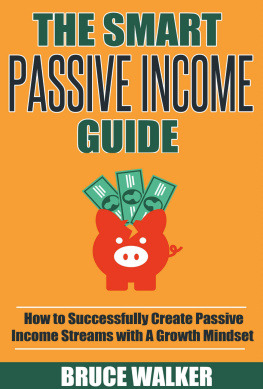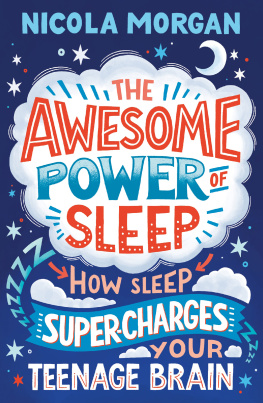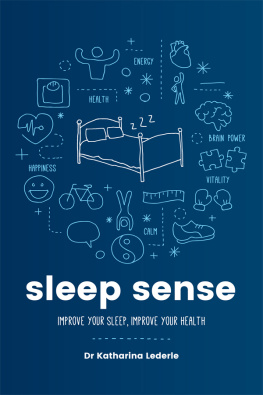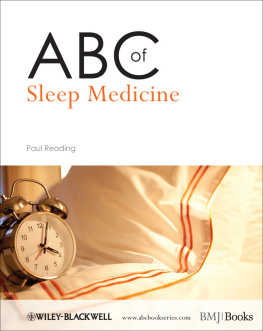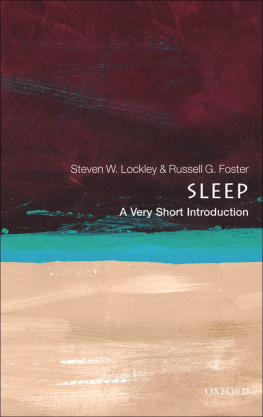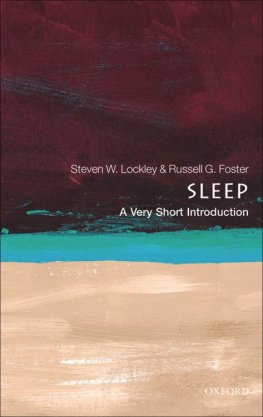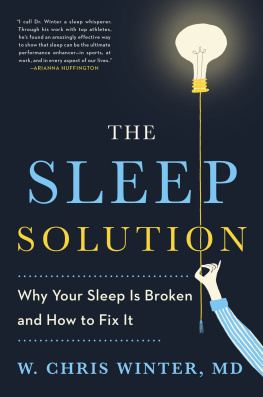Thank you for downloading this Simon & Schuster ebook.
Get a FREE ebook when you join our mailing list. Plus, get updates on new releases, deals, recommended reads, and more from Simon & Schuster. Click below to sign up and see terms and conditions.
CLICK HERE TO SIGN UP
Already a subscriber? Provide your email again so we can register this ebook and send you more of what you like to read. You will continue to receive exclusive offers in your inbox.
Contents
To Dacher Keltner, for inspiring me to write.
PART 1

This Thing Called Sleep
CHAPTER 1
To Sleep...
Do you think you got enough sleep this past week? Can you recall the last time you woke up without an alarm clock feeling refreshed, not needing caffeine? If the answer to either of these questions is no, you are not alone. Two-thirds of adults throughout all developed nations fail to obtain the recommended eight hours of nightly sleep.
I doubt you are surprised by this fact, but you may be surprised by the consequences. Routinely sleeping less than six or seven hours a night demolishes your immune system, more than doubling your risk of cancer. Insufficient sleep is a key lifestyle factor determining whether or not you will develop Alzheimers disease. Inadequate sleepeven moderate reductions for just one weekdisrupts blood sugar levels so profoundly that you would be classified as pre-diabetic. Short sleeping increases the likelihood of your coronary arteries becoming blocked and brittle, setting you on a path toward cardiovascular disease, stroke, and congestive heart failure. Fitting Charlotte Bronts prophetic wisdom that a ruffled mind makes a restless pillow, sleep disruption further contributes to all major psychiatric conditions, including depression, anxiety, and suicidality.
Perhaps you have also noticed a desire to eat more when youre tired? This is no coincidence. Too little sleep swells concentrations of a hormone that makes you feel hungry while suppressing a companion hormone that otherwise signals food satisfaction. Despite being full, you still want to eat more. Its a proven recipe for weight gain in sleep-deficient adults and children alike. Worse, should you attempt to diet but dont get enough sleep while doing so, it is futile, since most of the weight you lose will come from lean body mass, not fat.
Add the above health consequences up, and a proven link becomes easier to accept: the shorter your sleep, the shorter your life span. The old maxim Ill sleep when Im dead is therefore unfortunate. Adopt this mind-set, and you will be dead sooner and the quality of that (shorter) life will be worse. The elastic band of sleep deprivation can stretch only so far before it snaps. Sadly, human beings are in fact the only species that will deliberately deprive themselves of sleep without legitimate gain. Every component of wellness, and countless seams of societal fabric, are being eroded by our costly state of sleep neglect: human and financial alike. So much so that the World Health Organization (WHO) has now declared a sleep loss epidemic throughout industrialized nations. It is no coincidence that countries where sleep time has declined most dramatically over the past century, such as the US, the UK, Japan, and South Korea, and several in western Europe, are also those suffering the greatest increase in rates of the aforementioned physical diseases and mental disorders.
Scientists such as myself have even started lobbying doctors to start prescribing sleep. As medical advice goes, its perhaps the most painless and enjoyable to follow. Do not, however, mistake this as a plea to doctors to start prescribing more sleeping pills quite the opposite, in fact, considering the alarming evidence surrounding the deleterious health consequences of these drugs.
But can we go so far as to say that a lack of sleep can kill you outright? Actually, yeson at least two counts. First, there is a very rare genetic disorder that starts with a progressive insomnia, emerging in midlife. Several months into the disease course, the patient stops sleeping altogether. By this stage, they have started to lose many basic brain and body functions. No drugs that we currently have will help the patient sleep. After twelve to eighteen months of no sleep, the patient will die. Though exceedingly rare, this disorder asserts that a lack of sleep can kill a human being.
Second is the deadly circumstance of getting behind the wheel of a motor vehicle without having had sufficient sleep. Drowsy driving is the cause of hundreds of thousands of traffic accidents and fatalities each year. And here, it is not only the life of the sleep-deprived individuals that is at risk, but the lives of those around them. Tragically, one person dies in a traffic accident every hour in the United States due to a fatigue-related error. It is disquieting to learn that vehicular accidents caused by drowsy driving exceed those caused by alcohol and drugs combined.
Societys apathy toward sleep has, in part, been caused by the historic failure of science to explain why we need it. Sleep remained one of the last great biological mysteries. All of the mighty problem-solving methods in sciencegenetics, molecular biology, and high-powered digital technologyhave been unable to unlock the stubborn vault of sleep. Minds of the most stringent kind, including Nobel Prizewinner Francis Crick, who deduced the twisted-ladder structure of DNA, famed Roman educator and rhetorician Quintilian, and even Sigmund Freud had all tried their hand at deciphering sleeps enigmatic code, all in vain.
To better frame this state of prior scientific ignorance, imagine the birth of your first child. At the hospital, the doctor enters the room and says, Congratulations, its a healthy baby boy. Weve completed all of the preliminary tests and everything looks good. She smiles reassuringly and starts walking toward the door. However, before exiting the room she turns around and says, There is just one thing. From this moment forth, and for the rest of your childs entire life, he will repeatedly and routinely lapse into a state of apparent coma. It might even resemble death at times. And while his body lies still his mind will often be filled with stunning, bizarre hallucinations. This state will consume one-third of his life and I have absolutely no idea why hell do it, or what it is for. Good luck!
Astonishing, but until very recently, this was reality: doctors and scientists could not give you a consistent or complete answer as to why we sleep. Consider that we have known the functions of the three other basic drives in lifeto eat, to drink, and to reproducefor many tens if not hundreds of years now. Yet the fourth main biological drive, common across the entire animal kingdomthe drive to sleephas continued to elude science for millennia.
Addressing the question of why we sleep from an evolutionary perspective only compounds the mystery. No matter what vantage point you take, sleep would appear to be the most foolish of biological phenomena. When you are asleep, you cannot gather food. You cannot socialize. You cannot find a mate and reproduce. You cannot nurture or protect your offspring. Worse still, sleep leaves you vulnerable to predation. Sleep is surely one of the most puzzling of all human behaviors.


